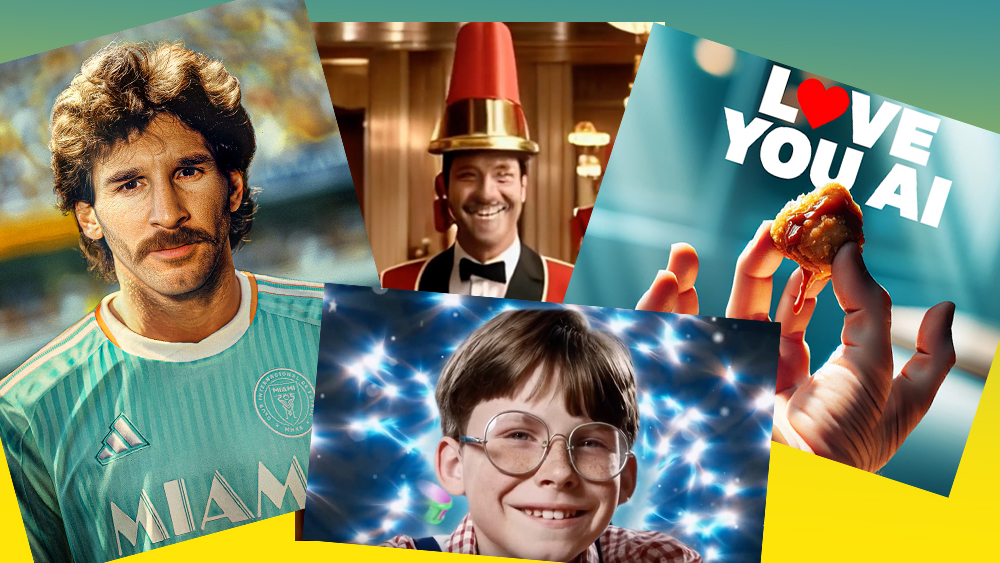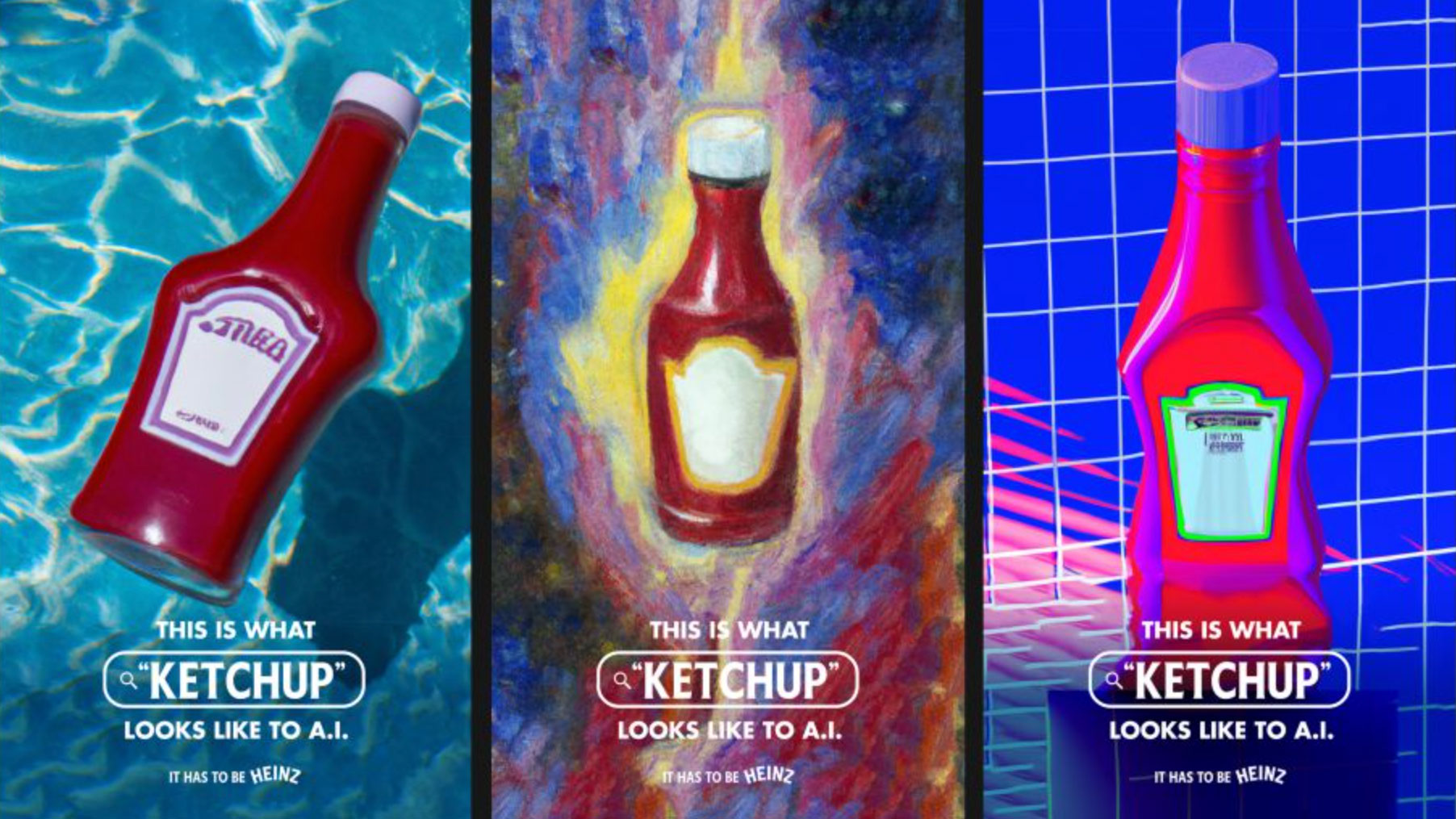
Daily design news, reviews, how-tos and more, as picked by the editors.
You are now subscribed
Your newsletter sign-up was successful
Want to add more newsletters?

Five times a week
CreativeBloq
Your daily dose of creative inspiration: unmissable art, design and tech news, reviews, expert commentary and buying advice.

Once a week
By Design
The design newsletter from Creative Bloq, bringing you the latest news and inspiration from the worlds of graphic design, branding, typography and more.

Once a week
State of the Art
Our digital art newsletter is your go-to source for the latest news, trends, and inspiration from the worlds of art, illustration, 3D modelling, game design, animation, and beyond.

Seasonal (around events)
Brand Impact Awards
Make an impression. Sign up to learn more about this prestigious award scheme, which celebrates the best of branding.
AI image generation is clearly here to stay, but that doesn't mean it's always a great idea to use it for finished assets in a commercial campaign. Some brands have made interesting use of the rapidly evolving tech, while some have failed spectacularly and others produced ads that were just plain ugly.
While some brands are banning AI in advertising, others are using it for a range of uses. The biggest potential is probably for strategy rather than for producing finished assets, but here we'll look at the best and worst forays into the latter, exploring what has worked well, what got panned, and what we never want to have to look at again.
AI advertising: the good
01. KitKat takes a break
Some of the best uses of AI image generation for advertising has poked fun at the tech, recognising its controversy and its weaknesses. For the KitKat AI ad above, the creative consultancy Wunderman Thompson Australia fed a model prompts like 'write a KitKat ad the way Gen Z speaks' to obtain AI-written scripts. It used a voice synthesizer to deliver the script and the AI art generator DALL-E 2 to generate imagery.
It was successful because of the self-satirising tone, the link to the the traditional "have a break" tagline and the timing. KitKat used the piece in early 2023 as AI image generators were becoming more widely known and concerns about them were mounting. The ad did date fairly quickly, though. The best image generators are now a lot more reliable than what the ad depicts.
02. Heinz finds itself everywhere

Going back even further, Heinz was one of the first major brands to use AI imagery for an ad. Like the KitKat example above, this piece was tongue-in-cheek, taking advantage of image generators' tendencies to mangle recognisable brands to show that ketchup means Heinz, even for AI. There were clearly a lot of images of Heinz Ketchup in DALL-E's training data.
03. Coca-Cola lets us Create Real Magic
With the technology improving and the novelty and comedic value of AI imagery wearing off, brands have started to find more serious ways to make use of the tech in campaigns. Many of the most successful have tapped into the interactive potential of generative AI, inviting the audience to participate by generating something of their own rather than merely observing. Coca-Cola's Create Real Magic campaign has been one of the most notable.
Coca-Cola's always going to do it big, and it wasn't going to invite people to use a generic AI image generator. It brought in OpenAI to create a bespoke ChatGPT and DALL-E-powered AI model trained on old Coca-Cola ad creatives. It invited people to use the model to create new Coca-Cola-themed artwork that it shared on its website. It was a risky for a big brand to be promoting and encouraging the use of AI image generation to the extent of handing over their own assets for training, but it showed how the process rather than the final product could be used to engage.
Daily design news, reviews, how-tos and more, as picked by the editors.
04. Inter Miami CF rewrites history
A post shared by Inter Miami CF (@intermiamicf)
A photo posted by on
This is the most straightforward use of AI imagery on the list, but it's one of the few examples that I think worked. One of the most popular uses of image generators has been to imagine unlikely scenarios, from Wes Anderson directing The Simpsons to the Pope in a puffer coat. That extends to rewriting history.
Lionel Messi was a baby in the 1980s, and Inter Miami didn't exist. But in a parallel universe, if both the club and the Argentine legend had been born earlier, Messi would surely have sported this tash. This is the kind of use of AI that would see some brands inundated with furious messages from fans, but the US soccer club could get away with it.
Created by the Buenos Aires-based agency Trans Company, the initiative was fun and well-executed. It also made sense in the context in which it was used, highlighting the retro vibes of the club's new third kit, which channels a vintage 80s Miami style as part of Adidas MLS Archive Collection. Sebastian Wilhelm and Maximiliano Anselmo were the creative directors and Florencia Spinetta the executive producer.
05. Burger King
Burger King followed the Coca-Cola route with its Million Dollar Whopper campaign and took it further. It created an AI model that allowed customers to design their own burger, but it put a twist on that by turning it into a real-world competition. Three finalists were invited to Burger King’s HQ to perfect their creations before they were put to a public vote.
A couple of things made this better than Coca-Cola's campaign in my eyes. Firstly, it highlights what AI is most useful for: playing with ideas and testing things out rather than generating finished assets. And it fit with Burger King's long-running 'Have it Your Way' tagline, making use of a new technology to apply that same concept for a modern audience in an interactive and engaging way.
06. Dove cracks The Code
Dove revolutionised marketing with its Real Beauty campaigns, and it remains one of the most consistent brands in the way it stands for a message and sticks with that message as fashions and technology evolves. It had already made statements on social media trends and TikTok filters, so it really had to say something about AI imagery. Announcing that it would never use AI-generated imagery to represent “real bodies” in its ads, it delivered a powerful short film taking aim at generic and unrealistic images of women produced by AI while also highlighting how it sees beauty.
AI advertising: the bad
01. Toys R Us freaks us out
Toys R Us, what were you thinking? The brand seemed very proud to be the one to make the "FIRST EVER brand film created with OpenAI Sora technology" without asking itself if there was perhaps a reason that nobody else had done it. The result showed the tech still isn't ready. And rather than helping to make Toys R Us relevant again, it just made it look sinister and creepy.
02. Under Armour ruins a decent ad with AI
This is one of those ads where you wonder if the brand was just out to cause controversy to get attention because Under Armour did almost everything wrong. They announced that the Anthony Joshua-narrated ad was AI-generated, and some of it clearly is. But it also includes real footage shot by uncredited directors for previous Under Armour ads. That meant it got hit by negative comments from all sides, from those appalled that the brand would use AI at all to those saying it was giving AI credit for human artists' work.
It seems a shame because the piece is visually striking. It could even have been compelling if it weren't for the distraction of the bad AI imagery, which makes a potentially epic ad look cheap and crappy.
03. KFC loves AI. But nobody else does
A post shared by Kentucky Fried Chicken (@kfc)
A photo posted by on
We saw above how Coca-Cola and Burger King used AI image generation to engage audiences in an interactive way. KFC showed us how not to do that in its half-hearted Love You AI campaign. It noticed that AI models tend to generate hands with too many fingers, which it reckoned means more 'finger lickin'. But initiative was too late and too lazy to capture anyone's attention.
Rather than using a bespoke model, it tried to encourage people to use the generic Meta AI image generator in Instagram to create images of hands eating KFC meals so it could repost them. Nobody bothered.
04. Absolut Vodka tries to fight AI bias... with more AI
If the KFC AI ads were the counterpoint to Coca-Cola and Burger King's approach, Absolut's strange AI campaign was the wrong-headed version of Dove's The Code. The brand suggested that we have to accept and roll with the fact that AI image generators are stealing online images for their training data and try to influence them by increasing the amount of diversity in the images they're stealing – not by taking photos, which would take too long, but by flooding the internet with diverse AI-generated fashion images that might just possibly maybe one day influence some hypothetical future AI model that happens to scrape them.
The ugly: Citizen M Hotels
Citizen M Hotels is another brand that used AI in a way that intentionally leveraged the inherent ugliness of the nascent tech's output. In what it claimed as the first AI-generated video advert, it used the nightmarish glitchy quality of crude visuals to show the terror of outdated, carbon-copy hotels with cloned concierges, awful guests, nausea-inducing buffets and a shower scene that's more disturbing than Psycho.
The aim was to present Citizen M as the antidote to this. The problem is that I now associate the brand more with those initial 28 seconds of horror than the final reveal, which is delivered with a voice so robotic it hardly makes Citizen M sound like the human-centric luxury hotel brand it claims to be.
For more AI advertising news, see the controversial Google Gemini AI advert and the Tedeschi Trucks Band poster controversy.

Joe is a regular freelance journalist and editor at Creative Bloq. He writes news, features and buying guides and keeps track of the best equipment and software for creatives, from video editing programs to monitors and accessories. A veteran news writer and photographer, he now works as a project manager at the London and Buenos Aires-based design, production and branding agency Hermana Creatives. There he manages a team of designers, photographers and video editors who specialise in producing visual content and design assets for the hospitality sector. He also dances Argentine tango.





